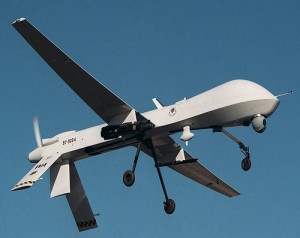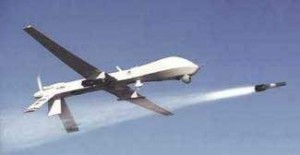Relentless Expansion of the Great War on Terror Despite Achieving Primary Goal
It is widely acknowledged that with the death of Osama bin Laden and a number of other high level leaders, al Qaeda is severely crippled in its one-time haven of Pakistan. Rather than acknowledging this victory in the primary objective of Authorization for the Use of Military Force in Afghanistan (passed on September 18, 2001 in response to the 9/11 attacks) and beginning to phase out the War on Terror, the US instead is finding a new target in Pakistan and building bases from which to launch even more drone attacks in Africa and the Arabian Peninsula, moves which amount to a significant expansion of the war effort.
In Pakistan, the Washington Post reports that the US is applying extreme pressure on Pakistan to dissolve the relationship between the ISI (Pakistan’s intelligence service) and the Haqqani network:
The Obama administration has sharply warned Pakistan that it must cut ties with a leading Taliban group based in the tribal region along the Afghan border and help eliminate its leaders, according to officials from both countries.
In what amounts to an ultimatum, administration officials have indicated that the United States will act unilaterally if Pakistan does not comply.
This threat of unilateral action is unlikely to be seen as mere bluster since the hit on bin Laden was unilateral.
It turns out that the Haqqani network is yet another example of a group the US helped to form only to become one of its targets:
The organization was formed by Jalaluddin Haqqani as one of the resistance groups fighting the Soviet occupation of Afghanistan in the 1980s, with U.S. and Pakistani assistance. In the Afghan civil war that followed, Haqqani sided with the Taliban forces that took power in Kabul in 1996. His fighters fled after the Taliban overthrow in late 2001 to Pakistan, where U.S. intelligence officials think they are in close coordination with al-Qaeda forces.
Pakistani intelligence maintained close connections to the network, now operationally led by Sirajuddin Haqqani, the founder’s son, as a hedge against the future in Afghanistan.
The Post article goes on to speculate that the Haqqani network’s attack on the US embassy in Kabul last week may have been final act to drive such strong language coming from Washington.
As if the declaration of a new enemy in Pakistan worthy of unilateral US action were not enough in the escalation of US war efforts, we also learn from the Washington Post that a new network of bases for drones is being built:
The Obama administration is assembling a constellation of secret drone bases for counterterrorism operations in the Horn of Africa and the Arabian Peninsula as part of a newly aggressive campaign to attack al-Qaeda affiliates in Somalia and Yemen, U.S. officials said.
One of the installations is being established in Ethiopia, a U.S. ally in the fight against al-Shabab, the Somali militant group that controls much of that country. Another base is in the Seychelles, an archipelago in the Indian Ocean, where a small fleet of “hunter-killer” drones resumed operations this month after an experimental mission demonstrated that the unmanned aircraft could effectively patrol Somalia from there.
The U.S. military also has flown drones over Somalia and Yemen from bases in Djibouti, a tiny African nation at the junction of the Red Sea and the Gulf of Aden. In addition, the CIA is building a secret airstrip in the Arabian Peninsula so it can deploy armed drones over Yemen.
Recall that just last week, the Obama administration was depicted as being in an internal debate on the legality of expanding the drone war outside of Pakistan to these very areas where the bases are being built. Considering that the bases are now already under construction, last week’s “debate” story would appear to have been nothing more than a mere academic exercise whose outcome had already been determined.
Only a fool would bet against Washington choosing more war in more locations.


